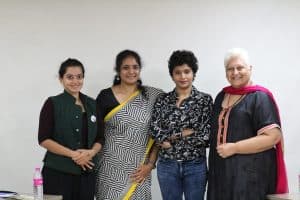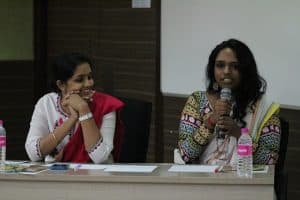Nirbhaya, Swathi, Hasini and Indhuja.
Even as we raise a toast to Manushi Chillar and celebrate the return of the Miss Universe crown to India, it is not easy to forget these women and countless others like them, who serve as constant and disturbing reminders of how cruel and brutal our cities can be towards women.
Crime statistics for the year 2016 released by the National Crime Records Bureau (NCRB) indicates that Chennai ranks third in crime rate and second in terms of incidence of crime, including crimes recognised under both Indian Penal Code (IPC) and Special and Local Laws (SLL).
The city is placed in 18th position in the category of Crimes against Women but retains the tag of ‘safe city’ for women. But every once in awhile, and quite frequently of late, news of a Swathi or an Indhuja makes it to the headlines, and we are left questioning our complacency and false sense of security. Is Chennai really safe for women?
City-based NGOs AWARE and Bhumi believe that a city can be made safe for women only through a Gender Equity Movement. As part of AWARE’s No More Nirbhaya campaign, a conference was held at the IIT-Madras Research Park on December 2, 2017, with the theme “Towards Safer and Gender-Empowered Chennai.” At the core of the conference was the premise that equality and equal opportunity could end violence against women.
The conference was attended by teachers, educators, public servants and changemakers in the city. With experts from different niches discussing and exploring various aspects of safety and empowerment, the conference identified three spaces in which action could make a clear difference to safety and gender empowerment.
Catch them young!
Schooling is a phase which leaves a deep impact on every kid, even unknowingly at times. Every child spends a good part of his waking hours in school and therefore, it becomes the prime responsibility of the facilitators and teachers to impart good qualities and values.
Panellists Arivarasan, a science teacher and programme director at Parikkshan Vigyan Rath, Sriram Sampath, co-founder of Edu-cater and Dr Prahalathan Karunakaran, co-founder of Bhumi spoke at length on how gender equity could be made an inherent part of school education.
But they also pointed out that while a child may be spending a relatively smaller share of her time with family, the quality of that time has a huge impact on children’s behaviour outside home, often for life. For example, a child who constantly witnesses his parents fight may grow up thinking violence is normal or permissible.
“Before they even come to school, learning should begin at home. The conversations/interaction and decisions made at home define the attitudes of the children. If a father dominates the mother, the child is likely to imbibe the same trait,” said Sriram.
Edu-cater has identified through recent research that representation of women in textbooks is just 6%; not a single independent woman who has risen to commendable heights in the professional world is featured. This implies that gender inequality starts right with the textbooks, eventually leading to a sort of bias against the other gender. In the absence of stories celebrating women and their achievements, the weakness of women is taken for granted.
Talking about school syllabus, Dr Prahalathan said that school curriculum must be restructured and equal emphasis given to women in various professions and walks of life. Educationists and the government must work hand-in-hand to ensure this.
Taking the arty route
The conference also saw a discussion on how art can empower both boys and girls and inculcate a sense of equity in them even as students. Theatre personality Samyuktha PC, Neerja Malik, a teacher, cancer survivor and motivational speaker, and Sharanya Bharath, co-founder of Edu-cater were invited to share their thoughts on this.

“Arts has a big role to play in teaching gender equity.” The panel (from left to right): Performer Subhashree, Sharanya Bharath, Samyuktha PC and Neerja Malik. Pic: AWARE
Samyuktha PC, Director-Theatre, Crea-Shakthi recalled how it is easy to spot the stereotyping prevalent in society, when boys are asked to play a girl’s role. They swirl their hips while walking, talk in a soft tone, act emotional etc. It is not that the kids always do so consciously, but their choice is governed by years of social conditioning.
“I believe both genders are extremely performative. The problem here is that even before children try to express their thoughts, they are instructed in expected norms of behaviour. Boys must be made to play the role of girls and girls as boys, and how they perform must be monitored. When our team is practising, and if a boy plays the role of a girl, we make sure that he does it how he wants to do it, and finishes the role play. After that, we discuss how a girl must be portrayed and must never be stereotyped,” she explained.
Safer transport in Chennai
A study conducted by ITDP five years ago showed that about 20 million Indian women did not take up work because of safety issues. Many women opt for studies at the college level but not everyone ends up working because of the lack of safe public transport. A majority of women take public transport to work and their feeling of insecurity during this commute determines their decision in a good number of cases.

Panelists Aswathy Dilip and Thirupurasundari discussing how transit sytems in Chennai can be made safer. Pic: AWARE
A panel discussion at the event drew attention to the safety issues in transit systems in the city. The participants here were Thirupurasundari, an Architect and Independent Researcher; Gnanasambantham S, Assistant Manager, Safety Department at Metropolitan Transport Corporation (MTC); Bennet Rajan from MTC; Aswathy Dilip, Program Manager, Tamil Nadu at ITDP; Sridevi, Inspector, Juvenile Aid Protection Unit for North and East zone of Chennai and Mohaneswari, Inspector, All Women Police Station, T Nagar. The panel was moderated by Radha Krishnan, Founder of Thozhan.
“To create safer transit systems, understanding women’s issues and the various metrics around these is important. The non-motorised transport policy proposed by ITDP has been adopted by the Greater Chennai Corporation. Presently, we are closely working with Chennai Corporation to help get the streets redesigned in accordance with the policy, with continuous and safe footpaths, cycle tracks, proper signage and lighting,” explained Aswathy.
As women in the audience spoke of various safety concerns and issues, Gnanasambantham acknowledged these and assured them that conductors and drivers would immediately come to women’s aid in case of problems. He said that a trial run of CCTV installation in buses had already been conducted.
“The conference brought the public, NGOs, not-for-profit organizations and government together to discuss the problems around women’s safety and gender equity. It has helped us understand the problems better and the takeaways will be implemented through our initiatives–Gender Equity Movement in Schools (GEMS), No More Nirbhaya and self-defence workshops for women,” commented Sandhiyan Thilagavathy, founder of AWARE.
A unique step towards awareness which is required for all kind of our younger generation.keep it up we are always with you.